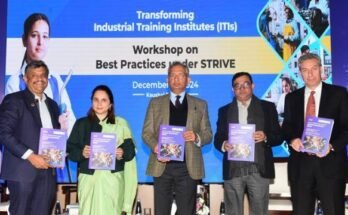New Delhi: With little to show by way of results, the for-profit skills training sector is set to get a dose of regulation, after close to a decade of unregulated existence.
The sector, considered key to improving employability of a sizable portion of India’s 520 million-strong labour market, will be brought under a statutory body, two government officials said, requesting anonymity.
The ministry of skill development and entrepreneurship is readying a plan and will move the cabinet soon for its implementation, they said.
“The larger education sector which is not-for-profit is regulated and often over-regulated, but the skills sector which is for-profit does not follow standard regulations,” said one of the two officials cited above.
“The need for regulation arises from the fact that when students are paying and the government is spending, why should private or public skill providers not be accountable to a structured body,” the official added.
Both short-term skill programmes run under the National Skill Development Corporation (NSDC) and long-term ones under industrial training institutes (ITIs) will be covered, the official said. The cabinet will, however, decide how statutory regulation will be brought in—by an executive order or legislation.
The move is expected to have three key impacts—curb the mushrooming of skill providers without quality control; bring over 13,000 ITIs under a a formal body; and further reduce the powers of NSDC, which has been instrumental in promoting private sector-led short-term skills education.
The second official cited above said that over the years, the skills ecosystem has not yielded enough results—both in terms of quality of training and placement. “This is a constant problem. Sometimes you find problems in institutions like NSDC or NSDA (National Skill Development Agency) and at other times, you see a huge gap in the delivery and intent of training and assessment providers,” the official added.
There are 347 training partners registered with NSDC. These training partners are required to place at least 70% of their trained candidates in jobs. But their placement record falls way short. A total of 3.15 million candidates were trained by these training providers during 2015-17, of whom 1.39 million candidates were “placed/upskilled/self-employed in the country”, the skills ministry told Parliament in August 2017. In other words, a success rate of just 44% instead of the required minimum of 70%. And that too after the government changed the definition of “placed” to “placed in jobs, self-employed or upskilled”.
This number throws up two key concerns—one, what is the fate of 56% candidates who are enrolled in skills programmes; and second, why are authorities not taking action against training partners who show enrolments on paper but cannot place them.
The skills ministry has also found that skill partners are outsourcing training, leading to poor accountability and outcomes. Last year, during a monitoring exercise of the Pradhan Mantri Kaushal Vikas Yojana (PMKVY), authorities found that franchise rules were compromised by several partners, forcing the ministry to tweak rules.
But some experts believe that the blame does not exclusively lie with the training partners. “The intention of the skills mission is very good but implementation has gone haywire. They set an overambitious target but made mistakes at several points—the labour market information system is in disarray, there are too many changes both in terms of policy and leadership level. What the sector needs is good regulation and policy consistency,” said Rachit Jain, founder of Youth4Work.
Note: News shared for public awareness with reference from the information provided at online news portals.



